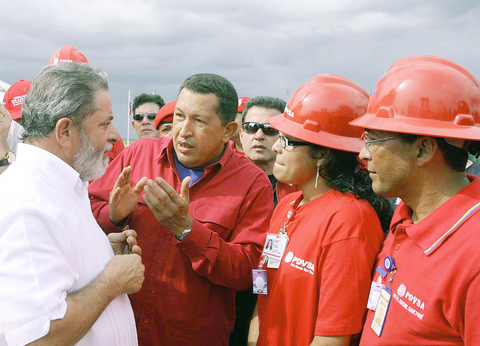Newly re-elected Brazilian President Luiz Inacio Lula da Silva offered warm words for Venezuela's Hugo Chavez on Monday, predicting the leftist leader would win elections next month on the strength of his measures to help the poor.
Silva, making his first foreign trip since winning a new four-year term last month, said it wouldn't be proper to endorse a candidate in Venezuela's Dec. 3 presidential vote, but added that Chavez's anti-poverty initiatives show his heart is in the right place.
"For many years here in Venezuela there wasn't a government that worried about the poor people as you have," Silva told Chavez in a speech. "It's the same people who elected me, who elected [Argentine President Nestor] Kirchner, who elected [Nicaraguan leader] Daniel Ortega, who elected [Bolivian President] Evo Morales. Surely, they will elect you president."

PHOTO: AFP
Silva and Chavez, both leading figures in the resurgent Latin American left, have built close ties despite differing approaches. While Chavez lashes out frequently at Washington, the more-subdued Silva maintains civil relations with the US government.
Nonetheless, the two have increasingly linked their countries through trade, infrastructure projects and deals to jointly explore for and refine oil.
On Monday, Silva and Chavez made an inaugural crossing of a new bridge near the city of Puerto Ordaz, calling it a key step toward South American integration.
The bridge -- the second to be built across the Orinoco River -- will cut the transport time for Brazilian exports entering Venezuela and reaching its Caribbean ports. It was built by Odebrecht, a Brazilian company, at a cost of US$1.2 billion.
Silva said he believes Chavez has shown "it's possible to grow economically while creating social justice."
Chavez said that he plans to reciprocate by visiting Brazil on Dec. 7, just days after he expects to be re-elected.
He said Silva's re-election was "vital for the future of all of us, for the unity of South America."
Chavez said both he and Silva have been wrongly "demonized" as leaders who oppose the private sector because their countries have been models of collaborative trade.
Trade between the two countries has also been swiftly growing -- it surpassed US$3.4 billion from January to last month, according to Brazilian statistics.
Last year, the two leaders laid the cornerstone for a US$2.5 billion refinery in the Brazilian state of Pernambuco that will process both Venezuelan and Brazilian oil.
Chavez and Lula attended a ceremony on Monday marking the start of drilling at an oil field in the Orinoco River basin.
Brazil's Petrobras is helping state-run Petroleos de Venezuela SA quantify Venezuela's massive heavy crude deposits. Petrobras also said negotiations were advancing with PDVSA to jointly develop five heavy oil fields and four offshore natural gas fields in Venezuela.
"It's a task that we have pending: a pipeline to bring gas to the people of the South," Chavez said.
The pipeline could cost about US$25 billion according to preliminary estimates by Petrobras.

A fire caused by a burst gas pipe yesterday spread to several homes and sent a fireball soaring into the sky outside Malaysia’s largest city, injuring more than 100 people. The towering inferno near a gas station in Putra Heights outside Kuala Lumpur was visible for kilometers and lasted for several hours. It happened during a public holiday as Muslims, who are the majority in Malaysia, celebrate the second day of Eid al-Fitr. National oil company Petronas said the fire started at one of its gas pipelines at 8:10am and the affected pipeline was later isolated. Disaster management officials said shutting the

SUSPICION: Junta leader Min Aung Hlaing returned to protests after attending a summit at which he promised to hold ‘free and fair’ elections, which critics derided as a sham The death toll from a major earthquake in Myanmar has risen to more than 3,300, state media said yesterday, as the UN aid chief made a renewed call for the world to help the disaster-struck nation. The quake on Friday last week flattened buildings and destroyed infrastructure across the country, resulting in 3,354 deaths and 4,508 people injured, with 220 others missing, new figures published by state media showed. More than one week after the disaster, many people in the country are still without shelter, either forced to sleep outdoors because their homes were destroyed or wary of further collapses. A UN estimate

The US government has banned US government personnel in China, as well as family members and contractors with security clearances, from any romantic or sexual relationships with Chinese citizens, The Associated Press (AP) has learned. Four people with direct knowledge of the matter told the AP about the policy, which was put into effect by departing US ambassador Nicholas Burns in January shortly before he left China. The people would speak only on condition of anonymity to discuss details of a confidential directive. Although some US agencies already had strict rules on such relationships, a blanket “nonfraternization” policy, as it is known, has

OPTIONS: Asked if one potential avenue to a third term was having J.D. Vance run for the top job and then pass the baton to him, Trump said: ‘That’s one,’ among others US President Donald Trump on Sunday that “I’m not joking” about trying to serve a third term, the clearest indication he is considering ways to breach a constitutional barrier against continuing to lead the country after his second term ends at the beginning of 2029. “There are methods which you could do it,” Trump said in a telephone interview with NBC News from Mar-a-Lago, his private club. He elaborated later to reporters on Air Force One from Florida to Washington that “I have had more people ask me to have a third term, which in a way is a fourth term